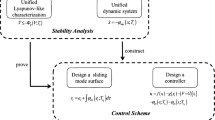Abstract
For the state control problem in finite-dimensional quantum systems with any initial state and a goal eigenstate, this paper studies the design method of control laws via the Lyapunov technology and in the vector frame, which ensures the convergence of any initial state toward the goal state. The stability of the closed-loop system in the goal eigenstate is analyzed and proven via the invariance principle. The simulation experiment on a spin-1/2 system shows the effectiveness of the designed control laws.
Similar content being viewed by others
References
G. M. Huang, T. J. Tarn, J. W. Clark. On the controllability of quantum-mechanical systems[J]. Journal of Mathematical Physics, 1983, 24(11): 2608–2618.
C. K. Ong, G. M. Huang, T. J. Tarn, et al. Invertibility of quantum-mechanical control systems[J]. Mathematical Systems Theory, 1984, 17(4): 335–350.
A. P. Peirce. Fifteen years of quantum control: from concept to experiment[M]//Multidiciplinary Research in Control, LNCIS 289. Berlin: Springer-Verlag, 2003: 65–72.
A. P. Peirce, M. A. Dahleh, H. Rabitz. Optimal control of quantum-mechanical systems: existence, numerical approximation, and applications[J]. Physical Review A, 1988, 37(12): 4950–4964.
S. G. Schirmer, M. D. Girardeau, J. V. Leahy. Efficient algorithm for optimal control of mixed-state quantum systems[J]. Physical Review A, 2000, 61(1): 012101.
D. D’Alessandro, M. Dahleh. Optimal control of two-level quantum systems[J]. IEEE Transactions on Automatic Control, 2001, 46(6): 866–876.
S. Kuang, S. Cong. Optimal control of closed quantum systems based on optimized search step length[J]. Journal of the Graduate School of the Chinese Academy of Sciences, 2006, 23(5): 601–606.
P. Vettori. On the convergence of a feedback control strategy for multilevel quantum systems[C]//Fifteenth International Symposium on Mathematical Theory of Networks and Systems. South Bend, Indiana, USA, 2002, CD ROM.
S. Grivopoulos, B. Bamieh. Lyapunov-based control of quantum systems[C]//Proceedings of the 42nd IEEE Conference on Decision and Control. Maui, Hawaii, USA, 2003: 434–438.
M. Mazyar, R. Pierre, T. Gabriel. Lyapunov control of bilinear Schrödinger equations[J]. Automatica, 2005, 41(11): 1987–1994.
S. Cong, S. Kuang. Quantum control strategy based on state distance[J]. Acta Automatica Sinica, 2007, 33(1): 28–31.
S. Kuang, S. Cong. Lyapunov control methods of closed quantum systems[J]. Automatica, 2008, 44: 98–108.
A. Assion, B. Baumert, M. Bergt, et al. Control of chemical reactions by feedback-optimized phase-shaped femtosecond laser pulses[J]. Science, 1998, 282(5390): 919–922.
M. Q. Phan, H. Rabitz. A self-guided algorithm for learning control of quantum-mechanical systems[J]. Journal Chemical Physics, 1999, 110(1): 34–41.
H. Zhu, H. Rabitz. Quantum control design via adaptive tracking[J]. Journal of Chemical Physics, 2003, 119(7): 3619–3625.
C. Altafini. Controllability of quantum mechanical systems by root space decomposition of su(N)[J]. Journal of Mathematical Physics, 2002, 43(5): 2051–2062.
V. Ramakrishna, R. J. Ober, K. L. Flores, et al. Control of a coupled two-spin system without hard pulses[J]. Physical Review A, 2002, 65(6): 063405.
Author information
Authors and Affiliations
Corresponding author
Additional information
This work was partly supported by the China Postdoctoral Science Foundation Funded Project (No.20080430772), the National Natural Science Foundation of China (No.60904033) and the National Key Basic Research Program (No.2006CB922004).
Sen KUANG was born in Henan, China, in 1976. He received a B.S. degree in Industrial Automation and a M.S. degree in Control Theory and Control Engineering from Henan Polytechnic University in 1999 and in 2003, respectively. He received a Ph.D. degree in Control Theory and Control Engineering from the University of Science and Technology of China in 2007. Currently, he is a postdoctoral fellow at the University of Science and Technology of China. His current research interests include quantum feedback control and its state estimation, and quantum optimal control.
Shuang CONG was born in Anhui, China, in 1961. She received a B.S. degree in Automatic Control from the Beijing University of Aeronautics and Astronautics in 1982 and a Ph.D. degree in System Engineering from the University of Rome “La Sapienza”, Rome, Italy, in 1995. She is currently a professor in the Department of Automation at the University of Science and Technology of China. Her research interests include advanced control strategies for motion control, fuzzy logic control, neural networks design and applications, robotic coordination control, and quantum system control.
Rights and permissions
About this article
Cite this article
Kuang, S., Cong, S. Generalized control of quantum systems in the frame of vector treatment. J. Control Theory Appl. 7, 395–399 (2009). https://doi.org/10.1007/s11768-009-7210-7
Received:
Accepted:
Published:
Issue Date:
DOI: https://doi.org/10.1007/s11768-009-7210-7




